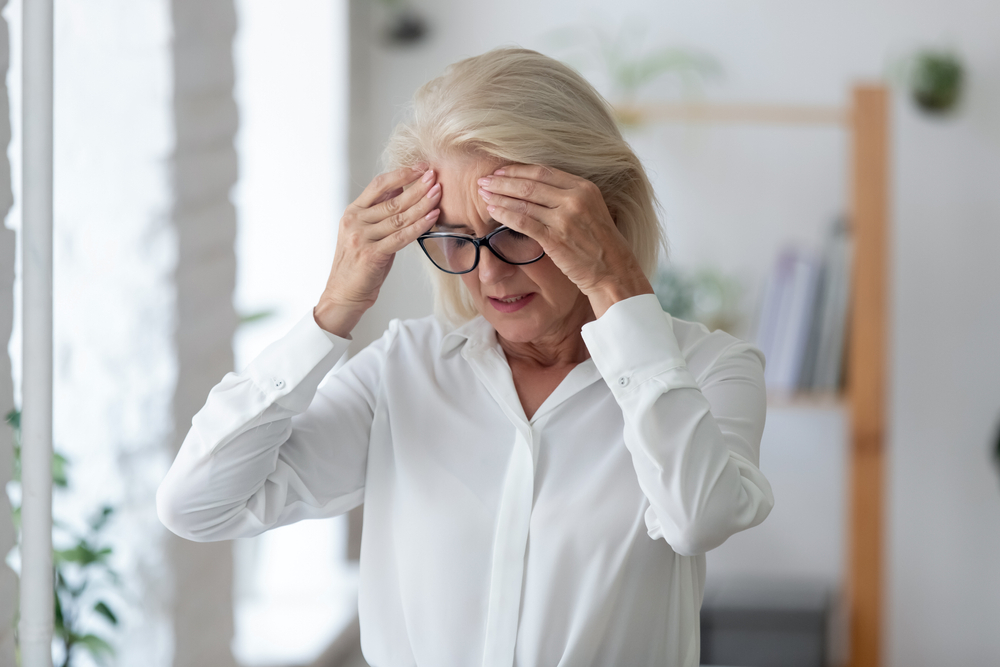Taking This Medication for Even a Short Time Spikes Your Dementia Risk
Multiple studies have linked these meds to dementia, according to a new report.

Milikmurisk of developing dementia is determined by a wide range of factors—some of which you can control, and others you can't. Your family history, for instance, is simply the luck of the draw, and much as you might wish to, you can't change your age. On the other hand, things like your diet, alcohol intake, and medication use are considered modifiable.
A new report warns that taking one medication in particular may put you at increased risk of later developing dementia—and that's hardly this drug's only drawback. Read on to learn which commonly prescribed medication may be putting you at risk, and why even short-term use can cause a problem.
READ THIS NEXT: Doing This at Night Makes You 30 Percent More Likely to Develop Dementia.
A new report raises serious concerns about this medication.

A 2021 report published by Psychiatric Times warns that the medication benzodiazepine, a psychoactive drug used to treat anxiety, seizures, and insomnia, has been linked with a high risk of dementia. It is often sold as Klonopin, Valium, Librium, Ativan, and under other brand names and generics.
"Although there are no randomized controlled trials (RCTs) looking at the association between benzodiazepine use and the risk for dementia, six prospective cohort studies, six case control studies, and one retrospective cohort study explore the relationship," the report says. Of the 13 studies mentioned in the report, eight showed a positive association between benzodiazepine use and dementia, and two more showed mixed or inconclusive results. The remaining studies found no discernible link.
READ THIS NEXT: Doing This in the Bathroom Could Be an Early Sign of Dementia, Doctor Warns.
One study found that even "short-term use" of the drug was linked to higher dementia risk.

A 2016 study published in BMJ and cited in the report looked specifically at how long patients used the drug as it related to cognitive outcomes. The researchers found that short-term use of the medication was associated with the development of dementia. "It remains uncertain whether long term use is associated with global cognitive decline," the study authors wrote. This complicates the widely held notion that benzodiazepines are considered safe for short-term use, a period typically defined as two to four weeks for this particular drug.
Benzodiazepine can cause other worrisome side effects.

Experts warn that benzodiazepines have long been linked with a wide range of potentially serious side effects. "These drugs are associated with many deleterious effects, including falls, fractures, traffic incidents, and delirium," explains the BMJ belajar.ae0fcc31ae342fd3a1346ebb1f342fcb
Additionally, benzos are known to cause drowsiness, confusion, blurred vision, loss of motor control, slurred speech, slowed breathing, muscle weakness, and more. However, you should not attempt to discontinue use on your own. Speak to your doctor for guidance on how to safely wean yourself from benzodiazepines.
For more health news sent directly to your inbox, sign up for our daily newsletter.
These meds put users at high risk of addiction.

Experts warn that in addition to raising dementia risk and triggering other side effects, benzos can also be habit forming. "Benzodiazepines work by slowing down nerve activity in the brain and the rest of the central nervous system, thereby diffusing stress and its physical and emotional side effects," explains the American Addiction Centers. In addition to their tranquilizing effects, benzodiazepines known to release "dopamine in the brain, which is the chemical messenger involved in reward and pleasure. The brain may learn to expect the regular doses of benzos after a few weeks of taking them and therefore stop working to produce these chemicals on its own without them."
Thanks to their addictive properties and many doctors' willingness to over-prescribe the drug, many users have become dependent on benzodiazepines. Speak with your doctor if you believe you're experiencing negative side effects of this drug, or if you've developed drug-seeking behaviors surrounding its use.
READ THIS NEXT: Drinking This Popular Beverage Slashes Dementia Risk, New Study Says.

Satu porsi makanan ini dapat secara signifikan meningkatkan asupan vitamin D Anda, kata para peneliti

